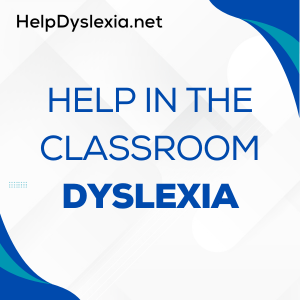Did you know that approximately 10% of school-aged children suffer from dyslexia? Dyslexia is the most common reading disorder, affecting both children and adults alike. This condition makes it hard to distinguish between individual letters, or even whole groups of letters, and can also cause problems with spelling, grammar, and writing. These difficulties make reading extremely challenging and can greatly impact a child’s education. Fortunately, there are many fun ways you can help kids with dyslexia in the classroom! Here are five suggestions to get you started.
Create Materials at Their Level
Rather than trying to force dyslexic students into reading material that doesn’t reflect their level, teachers should work to adapt materials for kids who are struggling. For example, if you have a student who is starting to read and struggling, it might be helpful for them to trace letters or words rather than sounding them out. This can help children develop an understanding of how our written language works before they try to tackle it themselves. Use Prominent Visuals: It’s common for people with dyslexia or other reading difficulties and learning disabilities (or even just poor spelling) that visual aides can help tremendously.
Provide Rewards
Let’s start off by talking about games. Whether you use board games, card games, or simply play video games together, make an effort to help kids work on reading skills while they play. For younger students (kindergarten and first grade), try playing Go Fish, Crazy Eights, or Old Maid. For older students (third through fifth grades), try Password, Candy Land, or Boggle. These types of games require less attention than video games—making them easier for kids with dyslexia—and still help build literacy skills. You can also break out classic family favorites like Apples to Apples and Scrabble: these are both great ways for students to test their vocabulary skills and spelling.
Use Games
One way to help kids who have dyslexia is by using games and play-based activities. Puzzles, board games, and video games can be an effective way of exercising brain function. Many kids who struggle with reading find that playing games helps them see letters and words as symbols rather than abstract concepts. Games can also encourage students who are struggling to build their confidence and feel successful at something, making it easier for them to focus on improving their reading skills later on.
Give Instructions One Step at a Time
To help dyslexic kids learn, teachers can give instructions one step at a time. For example, instead of saying, Write an essay using your notes, say something like, Tell me your favorite part of today’s lesson. Then, copy three sentences from your notes that you want to include in your essay. This way, kids are able to complete each step and feel successful as they go along. And they’ll probably enjoy doing it if you make it fun!
Make Lesson Plans Engaging
It can be hard for kids with dyslexia or other learning disabilities to stay engaged when listening to someone read aloud, but teachers can help by creating lesson plans that are more visually stimulating. Studies show that students who watched an animation while reading remembered and comprehended material better than those who read alone. If you want your students’ attention—and their participation—create animated videos of your lessons instead of simply reading them aloud. It could mean higher retention rates for many learners, including kids with dyslexia.


